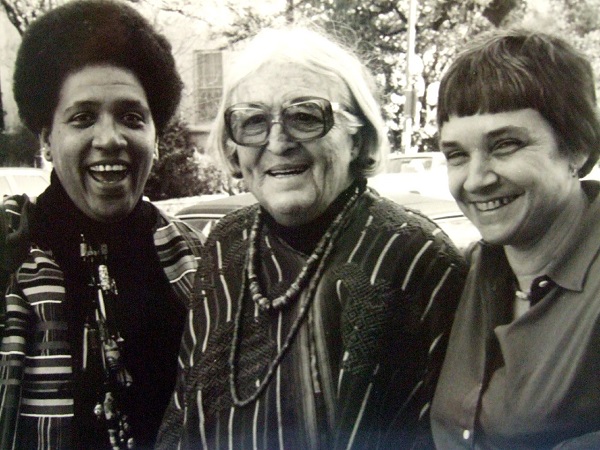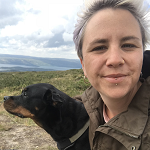by Annette Behrens
When I graduated from my masters at the LSE Gender Institute in 2013, I found it difficult to put into action all the things I had learnt. The year was very intense, fun and engaging, but it took me some time to figure out what to do with the experience and knowledge. Studying gender can be very different from other disciplines, and might change your life in some way or another. It did for me, and a lot of students I have seen go through a gender studies masters or programme. It may be a turbulent period for lots of reasons so here are some tips on how to approach it, and not just as an academic endeavour!

Audre Lorde, Meridel Leseur and Adrienne Rich, 1980
Photo source: Wikimedia
- Expect it to be more than an academic challenge! Studying gender is quite different to most other disciplines. Not only is it interdisciplinary, which means you will read a lot of different texts from a variety of academic literature, but it will also challenge your own personal values and beliefs. As an example, when I started my studies I had identified as a feminist for almost ten years, I had years of experience in activism and was relatively well informed in gender and radical politics. I was very firm and stubborn in my opinions on feminism, looking back I was a complete obnoxious know-it-all. I thought I would just read and meet people I already agreed with when I started the course. This is of course not what happened. I gained so many new perspectives on things that it took me more than that one year to process it all. Many of my political opinions were challenged and some of them changed drastically. This was hard and an emotional process, but in the end, I am really happy about it and grateful for all the people that were (and still are!) a part of that.
- You won’t become an expert on gender – no one is! You will absolutely gain more knowledge than most about social construction, performativity (you will get so sick of this word, I promise) and oppression, but remember gender can be extremely personal as well as elusive. You will become an academic knower about gender studies, but this doesn’t mean that you will understand everyone’s individual or social relationship to gender. The most important thing to take from your studies in this regard is knowing that you don’t know. This will also help you academically!
- Make friends. The personal is political, and the political is personal. Your fellow students will probably be as important in your studies as your reading list and tutors. Remember, gender is something everyone is experiencing, and having people around you also studying it is going to be an amazing resource. Firstly, because gender studies is so interdisciplinary (which essentially means it’s really hard) it will be useful to study together. You will probably find that your colleagues have a variety of different academic backgrounds, which is going to be very useful when you’re reading and learning. When I did my masters, there were people from art schools, economics, social work, development and language studies. I learnt so much from their various perspectives, as well as how to read Foucault and Deleuze! Secondly, because your studies will challenge many of your previously existing beliefs and ideas, having friends who are going through the same is so important! Most of you will probably have a lot of feelings around some topics, so I suggest that you, in feminist spirit, listen and talk to each other as much as you can. Studying gender can absolutely be a bonding experience. Share your different experiences and learn from each other. Thirdly, just make friends. Friends are great. Being a friend is feminist.
- Everyone is going to freak out at some point and that’s ok. Studying gender is really, really hard! Remember, you are studying one of the most important categories for understanding how our social world is constructed. On top of this, gender is of course never just gender, but also race, sexuality, class and everything else that forms our identities, power structures and experiences. That is a lot, and it is natural to get overwhelmed and frustrated. Try to think of your studies as a process (beyond the academic year)! Remember that your lecturers and tutors and fellow students are there to help you. You don’t need to know everything and you don’t have to understand (or read!) everything Judith Butler has ever published.
- Use your personal experiences but don’t treat them like academic truths. Using your own background to understand something can be really useful. Many of you probably already have thought a lot about gender, and I’m sure a lot of you come to gender studies for more than academic or professional reasons. Some of you are probably activists, writers or artists. And whatever your social background and interests, you all have personal experiences with gender. One of the really valuable things I learnt during my master’s was how to balance what I’ve learnt through my own experience and academic knowledge. This is the double edge of studying gender – everyone has some kind of gendered experience but this is not the same as academic perspectives. Yes, it is personal and you are of course allowed (and encouraged!) to relate to and share relevant experiences of what you are learning. However, this is not the same as expressing an academically-based opinion. In addition, having your experiences challenged through academic readings and perspectives does not mean that they aren’t valid or important. Don’t leave your experiences outside before you go into class, but don’t use them as stand-in curriculum or truths either. This will also make it a lot easier for your tutor to guide you through the readings.
- Feeling uncomfortable is part of the process. Feeling uncomfortable means you are actually learning something and relating to it. Your privileges will become very visible to you. You might feel uneasy about having gone to private school, being white, identifying as heterosexual etc, but don’t let this go to your head because it will make you completely (intellectually and emotionally) stuck. Remember the key to critical studies is that awareness of what we don’t know and what we can’t ever fully understand is valuable. It makes us reflexive and conscientious in our thinking and writing.
- USE YOUR PRIVILEGE! Remember when I said you’re not going be an expert on gender? This is not how you will be treated after you graduate. If you go to LSE for example, not only will you have had the privilege of learning from some of the best scholars and students in the field, but you will have a world-leading elite school on your CV. You will develop a highly “sophisticated” and conceptual vocabulary. You will likely get a good and important job, and people will listen to what you have to say. This is an extremely unique privilege and so it’s good to reflect on that throughout. How can you use your knowledge and degree to do something good for others? Not everyone can be a street-taking activist, but we can all be a little bit activist in our own and other people’s daily lives. The social structures that you learn about have real consequences of oppression and privilege. If you’re studying at a university that costs thousands of pounds a semester, remember how privileged you are to even be in the lecture hall. The important thing here is to not spend time feeling bad about it – instead, just put it to good use! The worst thing is simply inaction. Remember that not everyone has taken a gender studies class and most people will never read any of the scholars or books you will be studying. An important use of your privilege is being able to explain what you learn in a way that may be useful for others. So spread your knowledge! Raise your voice to amplify issues where underprivileged people typically aren’t listened to, and to support and work for people’ access to knowledge, representation and political action. Using your privilege is translating and transforming your knowledge into practical change.
I hope you’ve found some useful things here, and that it will make you feel more at ease with navigating your studies. Have fun, learn as much as you can, and use your knowledge.
Annette Behrens is a teacher in Oslo, Norway. She has an MSc in gender studies from LSE, and has further done research on gender relations, democratic structures and prefigurative pedagogy in activist groups in London.


